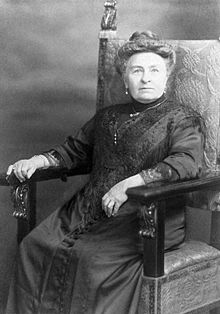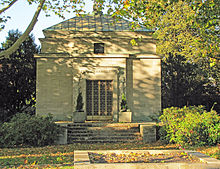Sophie Opel
Sophie Marie Opel (born February 13, 1840 in Dornholzhausen as Sophie Marie Scheller ; † October 30, 1913 in Rüsselsheim ) was a German entrepreneur from the Opel family . The Opel plants began producing automobiles under her leadership .
biography
Sophie was one of 13 children of the innkeeper Friedrich Franz Scheller and Susanna Maria Scheller, née Fischer. She initially helped in the “Zum Hirschen” inn at the entrance to Dornholzhausen (today part of Bad Homburg vor der Höhe ), which her father had bought in 1828 and which was later run by one of her brothers. In Dornholzhausen she attended school where she learned the French language .
On November 17, 1868, the landlord's daughter married master locksmith Adam Opel from Rüsselsheim , whom she probably met "at a young age". The honeymoon went to Paris . Sophie's dowry was initially modest, because the Scheller family was "inherently not wealthy". Adam Opel founded a sewing machine factory in 1862 and in the spring of 1868 relocated his workshop to a site on the Main Railway outside of Rüsselsheim.
When Friedrich Scheller won 100,000 thalers in the Braunschweigische Lottery in 1869 , which he divided among his ten children who were still alive, Sophie's share enabled the young couple to expand the small business and purchase a steam engine . Sophie's sisters Dorothée and Elise Scheller also invested their share of the profit in their brother-in-law's company. In the following year the company already employed 40 workers.
Sophie Opel was an accountant and responsible for paying weekly wages in the company, where sewing machines and bicycles were manufactured from 1886/87 . She also took care of sales representatives and apprentices. In 1879 she was entered in the commercial register as an authorized signatory .
In contrast to her rather reserved husband, Sophie Opel was not only enterprising but also energetic. On the occasion of Opel's application as "Grand Ducal Court Supplier ", a factory inspector at the Court Marshal's Office in Darmstadt reported in 1886:
“Ms. Opel participates personally in the management of the business, and no business-related action of any importance is undertaken without her prior knowledge and knowledge. She represents the business owner. She also made the suggestion for this proposal. "
The Opel family lived in a house on the Rüsselsheim factory site. Five children were born between 1869 and 1880: Carl , Wilhelm , Heinrich , Fritz and Ludwig . All five promoted the company's products as successful cyclists .
After the death of the company founder
Adam Opel, who suffered from typhoid fever and was dependent on a wheelchair towards the end of his life , died on September 8, 1895 as a result of his illness. His widow and the two eldest sons Carl and Wilhelm became partners in the Opel works, with Sophie Opel, who had previously run the company together with her husband, received the largest number of votes. She was also awarded half of the annual profits. So she had - next to her sons - an "important position in the management". The guardianship of the three sons Heinrich, Friedrich and Ludwig, who were still underage, was taken over by Georg Opel , the brother of the deceased.
Opel grew steadily under her leadership. In 1895 the company had over 1000 employees. In 1899, on the advice of her sons, Sophie Opel took over the Anhaltische Motorwagenfabrik of the automobile pioneer Friedrich Lutzmann from Dessau and began automobile production with the Opel patented motor car "System Lutzmann" . Carl and Wilhelm Opel had previously been co-founders of the " Central European Motor Vehicle Association ".
Because of increasing hearing loss, Sophie used an ear tube that she wore on a gold-plated chain around her neck. In 1912 she celebrated the fiftieth business anniversary of the Opel company.
Sophie Opel died of heart failure on October 30, 1913 . After her death, the coffin was carried through the entire plant. Sophie Opel is buried in the Opel mausoleum in Rüsselsheim am Main .
aftermath
In 2013, the city of Bad Homburg vor der Höhe erected a memorial plaque at the former location of the Schellerchen Gasthaus in Dornholzhausen to mark the centenary of Sophie Opel's death.
literature
- Gerta Walsh: Sophie Opel - 19th century entrepreneur. In: Hessian homeland. Issue 2/1992, pp. 68-70.
Web links
- Automobile pioneer: On the 100th anniversary of the death of Sophie Opel - Ceremonial laying of a wreath in Rüsselsheim to commemorate "Mother Opel" at media.gm.com
- The pioneer on taunus-zeitung.de
- Pictures ( memento from February 25, 2014 in the Internet Archive ) at caramia.de
- Sophie Opel in 1911
Remarks
- ↑ according to other sources as early as 1868, cf. The pioneer
- ↑ Image: Sophie Opel with hearing aid ( Memento from February 25, 2014 in the Internet Archive )
Individual evidence
- ↑ a b c d e f g h i j k l m n Gerta Walsh: Sophie Opel.
- ↑ a b c d e Gerta Walsh: Mother Opel from Dornholzhausen. In: 1699 - 1999. 300 years of Dornholzhausen. 300 years of the Waldensian parish. ( Digitized version )
- ^ "Opel, Adam". Hessian biography. In: Landesgeschichtliches Informationssystem Hessen (LAGIS).
- ^ A b Olaf Velte: The mother of the group on fr.online.de
- ↑ a b c d e Sophie Opel at Who's who - The People-Lexicon.
- ↑ a b The pioneer on taunus-zeitung.de
- ↑ a b c d e The new way of getting around on fnp.de.
- ^ A b c Hans Christoph von Seherr-Thoss : Opel. In: New German Biography . Volume 19, Duncker & Humblot, Berlin 1999, pp. 542-546, ISBN 3-428-00200-8 ( online ).
- ↑ Tradition on opel.de
- ↑ see Hessisches Staatsarchiv Marburg (HStAMR), Best. 906 No. 444, p. 374 ( digitized version ).
- ↑ Anke Hillebrecht: Homage to a strong woman on taunus-zeitung.de
| personal data | |
|---|---|
| SURNAME | Opel, Sophie |
| ALTERNATIVE NAMES | Opel, Sophie Marie (full name); Scheller, Sophie (maiden name) |
| BRIEF DESCRIPTION | German entrepreneur |
| DATE OF BIRTH | February 13, 1840 |
| PLACE OF BIRTH | Dornholzhausen |
| DATE OF DEATH | October 30, 1913 |
| Place of death | Ruesselsheim |



